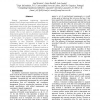Free Online Productivity Tools
i2Speak
i2Symbol
i2OCR
iTex2Img
iWeb2Print
iWeb2Shot
i2Type
iPdf2Split
iPdf2Merge
i2Bopomofo
i2Arabic
i2Style
i2Image
i2PDF
iLatex2Rtf
Sci2ools
114
click to vote
RE
2005
Springer
2005
Springer
Multi-Dimensional Separation of Concerns in Requirements Engineering
Existing requirements engineering approaches manage broadly scoped requirements and constraints in a fashion that is largely two-dimensional, where functional requirements serve as the base decomposition with nonfunctional requirements cutting across them. Therefore, crosscutting functional requirements are not effectively handled. This in turn leads to architecture trade-offs being mainly guided by the non-functional requirements, so that the system quality attributes can be satisfied. In this paper, we propose a uniform treatment of concerns at the requirements engineering level, regardless of their functional, non-functional or crosscutting nature. Our approach is based on the observation that concerns in a system are, in fact, a and concrete realisations, of abstract concerns in a meta concern space. One can delineate requirements g to these abstract concerns to derive more system-specific, concrete concerns. We introduce the notion of a compositional intersection, which allows us...
Functional Requirements | RE 2005 | Requirements | Requirements Engineering | Software Engineering |
Related Content
| Added | 28 Jun 2010 |
| Updated | 28 Jun 2010 |
| Type | Conference |
| Year | 2005 |
| Where | RE |
| Authors | Ana Moreira, Awais Rashid, João Araújo |
Comments (0)

